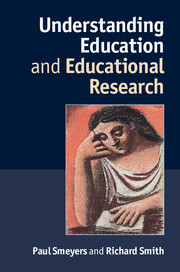Book contents
- Frontmatter
- Contents
- Acknowledgements
- Introduction
- 1 Education and its research
- 2 The nature of social science
- 3 The idea of method
- 4 The nature of philosophy
- 5 The art of research
- 6 Language, truth and meaning
- 7 On the dominant nature of educational research and its shortcomings
- 8 Research, policy and practical reasoning
- 9 The limits of measurement
- 10 Parenting and government intervention in the family (case study I)
- 11 Researching happiness and well-being (case study II)
- 12 Philosophy and research
- Notes
- References
- Index
2 - The nature of social science
Published online by Cambridge University Press: 05 November 2014
- Frontmatter
- Contents
- Acknowledgements
- Introduction
- 1 Education and its research
- 2 The nature of social science
- 3 The idea of method
- 4 The nature of philosophy
- 5 The art of research
- 6 Language, truth and meaning
- 7 On the dominant nature of educational research and its shortcomings
- 8 Research, policy and practical reasoning
- 9 The limits of measurement
- 10 Parenting and government intervention in the family (case study I)
- 11 Researching happiness and well-being (case study II)
- 12 Philosophy and research
- Notes
- References
- Index
Summary
A new ‘gold standard’: scientific research in education
A 2005 issue of Educational Theory published four papers that are of interest to those who want to understand the situation in which we as educational researchers seem to have landed. In her contribution, Margaret Eisenhart discusses several research designs for pursuing questions about causation in education. She opens with the observation that determining causation is a fixation in US society: ‘Educational researchers are no exception. We are desperate to know what events and processes lead to what educational outcomes, so that we can promote the outcomes we want and eliminate the ones we do not want’ (Eisenhart, 2005: 245). Her interest has to be understood in the context of the recent report of the USA’s National Research Council (2002), Scientific Research in Education. According to a host of critics, this report embraces too limited a view of causation and causal explanation and thus advances a position on educational research methodology that differs little from the previously described retrograde view (see Chapter 1) that seeks to reinstate experimental-quantitative methods as the ‘gold standard’ of educational science. Thus Eisenhart welcomes, for instance, approaches that insist both on descriptive knowledge as essential if causal analysis is to succeed and on the fact that causal mechanisms cannot be isolated but instead have to be understood as specific to context and intentions if they are not to lose their causal power.
Eisenhart also insists on the importance of building on shared commitments and working collaboratively from a variety of perspectives to improve student learning, especially for those who are struggling in school and society. In a similar vein Pamela Moss (2005), following Gadamer, argues that the value of general principles does not lie in serving as a guide for action, but rather in becoming a guide for reflection. Competing principles can be productively and instructively brought to bear on and challenged by a given case where a decision needs to be made. She concludes that what we need is open debate and criticism. Thomas Schwandt too rejects the dichotomous thinking that drives a wedge between quantitative and qualitative methods.
- Type
- Chapter
- Information
- Understanding Education and Educational Research , pp. 29 - 48Publisher: Cambridge University PressPrint publication year: 2014
- 1
- Cited by



